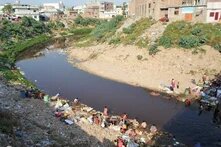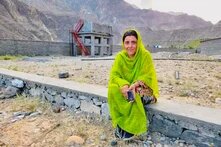
Extensive regulations limit civil society organisations’ potential to perform effectively during humanitarian crises in disaster prone Pakistan.

Introduction of extensive regulatory framework involving lengthy procedures of registration, security clearance and funding collection approvals in 2019 is posing challenges for civil society organisations (CSOs) in responding effectively to disasters in Pakistan, a South Asian nation of 249.5 million people ranked among the top 10 in the Global Climate Risk Index’s list of countries highly vulnerable to climate disasters.
Frequent climate induced disasters, especially the monstrous floods of 2022 in the country, raised concerns of social activists over decline in performance of CSOs in reaching out to the vulnerable segments due to cumbersome regulations. According to representatives of the civil society, Pakistan is among those few countries that have been facing disasters on a regular basis and the devastating damage due to last year’s catastrophic flood was a wakeup call for policy makers to ease regulations and remove barriers from CSOs so that they performed more effectively during humanitarian crises. They said the Pakistan government implemented strict regulations during the last few years to monitor the activities of non-governmental organisations, including small community based non-profits, in compliance with the demands by international regulatory organisations, including the Financial Action Task Force (FATF), for countering terror financing and money laundering. However, they added, implementation of international laws without sufficient technical support, capacity building of working staff and resources created severe challenges for CSOs, especially those working in rural areas, for sustaining their services and even survival.
Conformity in Government-CSO relations urged
“The current registration process for CSOs is lengthy and complex, which creates barriers for the organisations to operate effectively,” said Qamar Naseem, programme manager, Blue Veins, a Peshawar based NGO that has set up a help desk and a helpline to facilitate CSOs in legal compliance, registration with relevant rules and in obtaining no objection certificates(NOCs).
Naseem, who is a member of NGOs’ Deregistration and Reinstatement Board of Pakistan, is of the view that the government should streamline the functioning of civil society to enable their effective participation in the development of society and support of the vulnerable segments considering the vulnerability of the country to severe climate disasters. The government constituted board serves as a bridge between the government and the NGOs whose registration was cancelled. He added that effective coordination and partnership with CSOs at national and international level could pave the way for coming out of the crisis the country was facing in the wake of unprecedented deluge.
Overburdened by regulations
In October 2022, leading non-profit Awaz Centre for Development Service (Awaz CDS) and Pakistan Development Alliance (PDA) – an alliance of 107 national level NGOs – jointly conducted a nationwide survey on various challenges faced by CSOs from the existing legal and regulatory frameworks.
While sharing the details of the survey, Zia ur Rehman, chief executive of Awaz-CDS, said that the civil society sector was found to be under severe stress after the introduction of new regulations. “Overlapping policies and compliance requirements overburdened the civil society sector and more than 20,000 NGOs and community based organisations were deregistered in the country during the last few years,” Rehman said.
The survey found that more than 60 per cent of the NGOs working in the country faced challenges to obtain various types of memorandums of understanding (MOUs), NOCs and other permissions to implement their development interventions, while more than 81 per cent of NGO representatives faced challenges in opening bank accounts for their projects.
“"There were around 5,000 registered NPOs (non-profit organisations) in Khyber Pakhtunkhwa province of Pakistan before 2019 out of which now 1,200 remain. The rest of them are closed or blocked due to their inability to comply with rules, resulting in the loss of jobs of around 45,000 skilled workers including women,” said Yar Muhammad Shaheen, president, Khyber Pakhtunkhwa chapter of CSOs of Pakistan.
Andan Bashir, a civil society activist from Punjab, the most populous province of Pakistan with a population of 127.4 million, said that the majority of civil society workers had started searching for alternate sources of earning due to severe reduction in projects. “The NGO workers have been sitting idle for months due to lack of work, which reflects the impact of extensive regulations on working of welfare oriented organisations,” Bashir added.
In Balochistan, people are living in destroyed houses and are in dire need of help due to devastation wreaked by disastrous floods and inclement rains in the province, said Mir Behram Lehri, a social worker associated with Sehar, a non-profit engaged in relief and rehabilitation in the affected areas. Comparing relief and rehabilitation work with damage caused by flood, he said that very nominal work had been done due to difficulties faced by development organisations.
“Improved mutual cooperation among government and the non-profit sector is essential to promote human rights and sustainable development in the country,” said Amina Durrani, director of programme, Khyber Pakhtunkhwa Commission on the Status of Women (KPCSW). Quoting the finding of a spotlight report prepared in 2022 on the achievement of Sustainable Development Goals (SDGs), Durrani said Pakistan made moderate progress on some of the goals and concerted actions were required to make accomplishment of all the 17 goals till the timeframe of 2030.
Hurdles by weak capacity, poor infrastructure
Speaking on condition of anonymity, an official of the Social Welfare Department said that the majority of the NPOs that were closed due to non-compliance were performing in rural areas and the main reason behind the closure of operation was lack of understanding and capacity for compliance to strict regulations.
“In remote areas, especially in mountainous regions, where climate catastrophes mostly happen due to glacial lake outburst flood events, land sliding and floods, how can compliance to international obligations be ensured when there is no proper infrastructure to ensure provision of proper electricity connection and internet connectivity besides suitable working environment?” he said.
Closure of thousands of NPOs, he added, had resulted in shutting down of a large number of orphanages, widows caring centres, skill development centres for youth and labourers.
Adverse trickle down impact
According to Shaheen, adoption of strict policies for registration and compliance of other regulations in receiving funds has inflicted a colossal damage to the development sector. It has, he said, deprived hundreds of thousands of people in the country from benefiting from humanitarian aid by national and international organisations in health, education, nutrition, child protection, skill development, drug rehabilitation sectors.
“People are suffering because of the inability of NPOs in performing effectively due to a strong filtration process. In most of the areas organisations are willing to extend help to affected people but are restricted due to strict policies relating to release of funds,” he added.
Shaheen is of the view that rules enacted in developed countries cannot be implemented in developing countries while keeping in view the educational standards of working class, both in private and public institutions. Besides, he said, lack of proper infrastructure facility, especially uninterrupted electricity supply and strong internet service, online service delivery could not work effectively, and affected working of institutions.
Hazrat Khan, a social activist who works for skill development of labour in Islampure area of Swat, a mountainous district of Khyber Pakhtunkhwa, most vulnerable to flooding, recently secured funding from Malala Fund, an international non-profit, but is facing problem in its release from different departments.
“If I did not get the funds released in time and failed to utilise it in the stipulated period, the amount would lapse and my organisation might also be blacklisted for future dealings,” Khan said.
Measures for easing compliance
According to Muhammad Karman, deputy director, Registration, Social Welfare Department, Khyber Pakhtunkhwa, the government realises the hardships faced by the NGOs in compliance to cumbersome regulations and is taking different measures for facilitation and continuation of working of such organisations.
Karman said that government was preparing standard operating procedures (SOPs) and would also develop a web portal for facilitation of the organisations to get them registered online. “These SOPs are designed in such a manner that the problems faced by humanitarian organisations will be resolved to the maximum extent. It will make the procedure simple and easy for compliance,” he claimed.
The summary of SOPs is in pipeline passing through different offices for vetting and will be finally approved through Parliament. Karman said that realising the severity of 2022 floods and urgent need of people for help, the government had decided to exempt local NGOs from signing MoUs with the Economic Affairs Division (EAD) for receiving foreign funds to conduct relief, reconstruction and rehabilitation. However, this exemption is only applicable to organisations that had applied for being granted the status of an NGO till 5 August 2022 and have a valid facilitation letter while their files are pending with the EAD.
Speaking to social activists in Peshawar recently, Tariq Javed, commissioner, National Commission for Human Rights (NCHR), said the government was committed to creating an enabling environment for CSOs to operate effectively and would consider their demands and work towards streamlining the registration and NOC process. “Civil society plays an important role in the country for social, political, economic progress and mobilises people and resources for providing relief to distressed population,” Javed said. “The existing laws and regulations are enacted to ensure transparency and accountability in working of NGOs, which must improve their compliance to regulatory frameworks.
Meanwhile, civil society activists in a joint proposal have suggested for holding of a constructive dialogue among all the stakeholders to identify ways and address challenges of shrinking spaces for civil society to perform to help the people during humanitarian crises.








